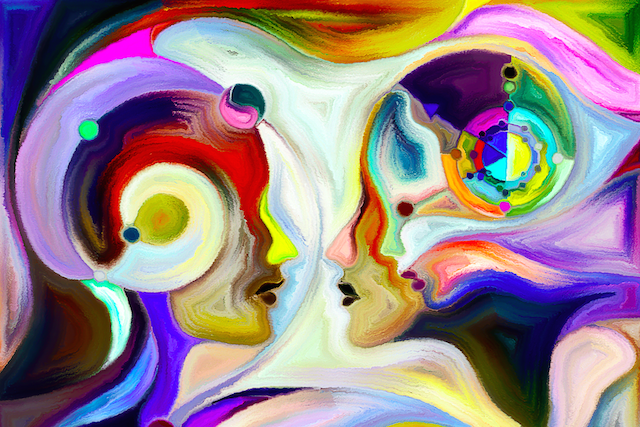
“True love is born from understanding.” ~Buddha
I believe one of our strongest desires in life is to feel understood.
We want to know that people see our good intentions and not only get where we’re coming from but get us.
We want to know they see us. They recognize the thoughts, feelings, and struggles that underlie our choices, and they not only empathize but maybe even relate. And maybe they’d do the same thing if they were in our shoes.
Maybe, if they’d been where we’ve been, if they’d seen what we’ve seen, they’d stand right where we are now, in the same circumstances, with the same beliefs, making the same choices.
Underneath all these maybes is the desire to feel validated.
We’re social creatures, and we thrive when feel a sense of belonging. That requires a certain sense of safety, which hinges upon feeling valued and accepted. But those feelings don’t always come easily.
There was a time when one of my relationships felt incredibly unsafe. I never felt understood or validated, and worse, I often got the sense the other person didn’t care to understand me.
When you’re the one withholding the comfort of understanding, it can imbue you with a sense of power. And it also creates a sense of separation, which, for some, feels safer than closeness.
This person often assumed the worst of me—that I was selfish and weak—and interpreted things I did through this lens.
They would belittle my beliefs and opinions, as if they warranted neither consideration nor respect.
And they would even make fun of me when I tried to share my thoughts and feelings, minimizing not only my perspective but also my personhood. Like I had no value. Like I wasn’t worth hearing out. Like I didn’t deserve respect.
It hurts.
It hurts to feel like someone doesn’t care to see where you’re coming from or hear what you have to say.
It hurts to feel like someone is more committed to misunderstanding you than developing any sense of common ground.
It hurts to feel invalidated.
We often take that pain and churn into anger. Or at least that’s what I did.
I fought. I screamed. I cried. I tried to force them to see my basic goodness and view the world from my vantage point.
I tried to impose my will upon them—the will to be valued and heard—regardless of whether they were willing or capable of giving me those courtesies. And I caused myself a lot of pain, all the while justifying this madness with an indignant sense of righteousness.
Because people should try to understand. People should treat each other with respect. People should be kind and loving and open. Because that would make the world feel safe.
But here’s the thing I’ve learned: Should is always a trap. Things will never be exactly as we think they should be, and resisting this only causes us pain.
But more importantly, there’s something more empowering than trying to force other people to be who we think they should be—and that’s being that person ourselves.
In this case, I realized, that meant understanding the person who wouldn’t or maybe couldn’t understand me.
Remember what I wrote about separation feeling safer for some than closeness?
This was actually a huge insight for me. That perhaps when someone seems unwilling to embrace me with understanding, it’s more that they’re unable to let me in, for reasons I might not ever know.
I actually did a lot digging to try to understand what would make someone—and specifically, this someone—closed off to understanding. What pain could have hardened their heart so dramatically? As often happens when you dig, I found a lot to explain it.
I found unresolved traumas that likely led to deep feelings of shame and vulnerability—which likely cemented into a need to always be and appear strong. Impenetrable. And when you’re impenetrable, not much can get in. Not new ideas, and definitely not attempts at deep connection. Which is really sad when you think about.
Sure, it hurts to feel someone doesn’t understand you. But can you imagine the pain of rarely understanding anyone because letting someone into your heart actually hurts? Can you imagine living life so guarded, so scared, constantly hiding—and possibly without even realizing it?
I’ve come to believe that when someone won’t make any effort to understand us, this is usually what it comes down: deep pain that’s blocking them from love.
They might be shut down to everyone. Or specific ideas that trigger something from their past. Or maybe we, ourselves, are the trigger.
Maybe we remind them of something they want to forget. Maybe our very presence forces them to come face to face with something they’d rather avoid.
I remember reading an article once about the contentious relationship women often have with their mothers-in-law. The author used, as an example, a mother-in-law who always complained about her daughter-in-law’s couch, and then wrote, “You never know. She may have been raped on a couch that looked just like yours.”
This hit me hard. The thought that everyone has secret pains, sequestered in shame, that often manifest in hurtful behaviors.
I know I’ve been there before. Though I’m not proud to admit it, I’ve shut people out or shut them down because they’ve triggered something painful in me. Knowing this, I understand how pain can bring out the worst in us.
Considering this doesn’t justify disrespect or mistreatment of any kind. It doesn’t condone abuse. But if we really want understanding, maybe the key is to choose understanding.
Maybe the secret is to broaden our perspective beyond what would make us feel safe in a moment so we can do our part to help create a greater sense of safety for everyone we encounter.
Maybe by choosing to offer understanding, we can influence the people around us to heal their pains so they can one day open their heart a little wider. When they’re ready. When they feel safe.
So what’s the best thing to say to someone who doesn’t understand you? I think it’s, “I understand that you can’t understand.”
I think it’s accepting the other person where they are, even if you have no idea where they’ve come from or what’s driving them.
Because even if we don’t know the specifics, we can know there’s some explanation—some complex web of past events and psychological factors that make them who and how they are.
This isn’t easy to do.
It often requires us to create boundaries, whether that means avoiding specific conversations or even creating physical distance in that relationship.
It requires us to pause and connect with our deepest intentions before reacting impulsively, defensively, in anger.
And it also requires us to mourn and let go of the relationship we hoped to have, knowing we’re offering the kind of compassion and consideration to someone else that they may never be able to give us back.
I take comfort in knowing this is the higher road, not because I feel superior on higher ground but because it’s less painful there—for me, and for everyone I encounter in my life.
When I choose to be the change I wish to see, it’s less important to me that everyone else sees me, values me, gets me, and understands my good intentions—because I do. Because I know I am coming from a place of love, kindness, and integrity.
And this is a strong foundation for navigating a world full of hurt people who aren’t ready or able to love.
About Lori Deschene
Lori Deschene is the founder of Tiny Buddha. She started the site after struggling with depression, bulimia, c-PTSD, and toxic shame so she could recycle her former pain into something useful and inspire others to do the same. You can find her books, including Tiny Buddha’s Gratitude Journal and Tiny Buddha’s Worry Journal, here and learn more about her eCourse, Recreate Your Life Story, if you’re ready to transform your life and become the person you want to be.
- Web |
- More Posts












 Though I run this site, it is not mine. It's ours. It's not about me. It's about us. Your stories and your wisdom are just as meaningful as mine.
Though I run this site, it is not mine. It's ours. It's not about me. It's about us. Your stories and your wisdom are just as meaningful as mine. 